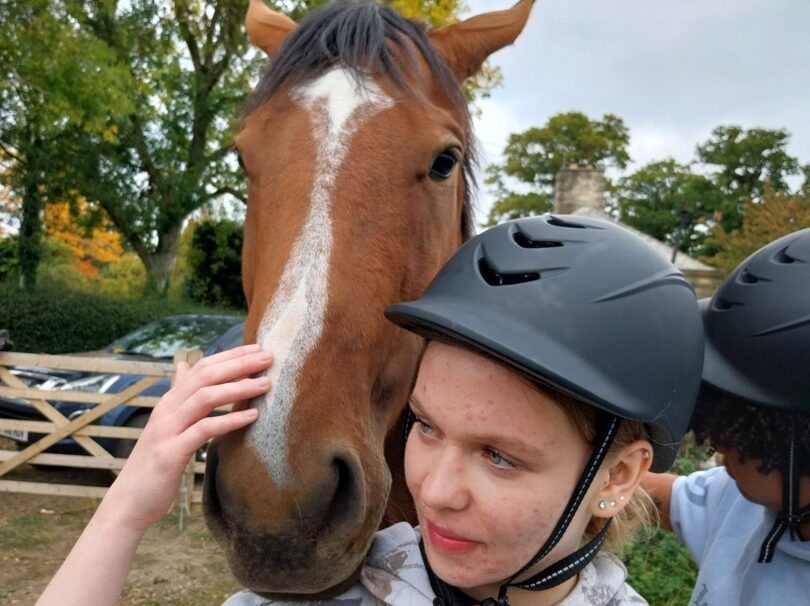Teachers are doing their very best but are seeing the detrimental effects of poverty daily. In the words of this secondary teacher in Wiltshire, so much that is taken for granted in reasonably well-off families is absent for those who grow up with poverty.
“Children growing up in poverty overcome challenges before they even get to school and are more likely to be reluctant learners. It can cause difficulties in physical and mental health, resilience, and ability to learn. A lot more children than you would think go to school hungry, causing tiredness and poor concentration. Many children feel different as they haven’t got the right uniform, some families I have worked with struggled having enough hot water for everyone to have a shower or to use the washing machine (if they had one) often bullied for not being clean or having the same as others. With poverty comes limited access to books/learning resources/IT/internet to support learning at school. Also limited access to enrichment activities such as days out/holidays/school trips etc.. and other confidence boosting activities. I worked with one young person who had never left his own small town to experience other places. All increase the financial as well as cultural gaps between those who have and those have not. This gap is growing rapidly not diminishing. COVID has made this more pronounced, but it was on the increase before. Limiting educational achievement, engagement, aspirations and life chances for these children”. Secondary Teacher, Wiltshire.
“Poverty is on the increase”. Words we keep hearing, the effects we keep seeing. On our farms we are seeing more and more children come from families that are defined as living in poverty. Poverty is a barrier to children thriving, to finding their potential, to becoming positive contributing citizens. Life living in poverty can sadly mean a child’s life is saturated with anxiety. Managing school and the expectations of fitting in socially, whilst achieving academically can be unattainable. Maslow gave us a great pyramidal model of the hierarchy of needs, body first followed by mind and then spirit. Self-actualisation, self-esteem, at the top of this crest cannot be achieved if your basic needs of food, shelter and warmth are not met. Teachers are daily meeting children who cannot concentrate as they are hungry – physiological needs trump all else. Emotional and intellectual development can only take place if we feel safe, without fear, safe to learn, to take the risk of trying and maybe failing, to give things a go, to say Yes to a challenge, not No.
According to the Joseph Rowntree Foundation living with poverty in the UK means “not being able to heat your home, pay your rent, or buy the essentials for your children. It means waking up every day facing insecurity, uncertainty, and impossible decisions about money. It means facing marginalisation and even discrimination because of financial circumstances. The stress it causes can lead to problems that deprive people of the chance to play a full part in society.”
Absolute poverty, rather than relative poverty, is where a household’s income is less than 60% of the median as it stood in 2011. According to the Child Poverty Action Group, currently 22% of households in the UK have an income below the poverty line after housing costs are taken into account. 31% of children live in households below the poverty line.
Poverty based on hardship indicates that 100,000 children lack three meals a day or a warm winter coat. 400,000 children go without fresh fruit or veg at least once a day and 3.2 million children don’t have a one-week holiday once a year (source: Child Poverty Action Group).
Across the country state schools are seeing the effects of this hardship with children arriving in school hungry and unable to concentrate, anxious and distracted, having left a parent or parents who are worrying about whether they can keep the roof over their heads, who feel dispirited as they feel the bottom of the pile. Are we expecting teachers to work miracles in the face of physical and mental ill health caused by poverty? They are asked to keep up with league tables and be measured by academic success, but the gap is widening, and poorer children can feel more and more disenfranchised.
The Joseph Rowntree Foundation has tracked and evaluated the consequences of poverty in the UK and it makes for shocking reading; Health problems, Housing problems, Being the victim or perpetrator of crime, drug or alcohol problems, Lower educational achievement. Poverty in childhood increases the risk of unemployment and low pay in adulthood, and lower savings in later life. Homelessness, teenage parenthood, relationship and family problems, biological effects – poverty in children early in life can have a harmful effect on their brain development.
The Beatles song, All you need is Love, seems out of step in a time when so many people are not able to meet their survival needs – food, water, shelter, warmth. Mothers describe the pain of having to decide between a bus fare to get a child to school or buying food for the table. Many of us have experienced Hangry children, feed the hunger, and dissolve the anger. What would it be like to have to calculate each day where the priorities lie between the basic needs of paying for a roof over your children’s heads, or their food and clothes, not to mention all the other costs of family life? Many parents are having to do shift work which leaves children as latch key kids, or even in some cases work away from home, and older siblings end up being carers for younger ones. Guilt and shame are the residue emotions for families to survive.
On our farms we hear children describe depressed parents where anxiety about money has tipped them into drug taking, alcoholism, and domestic violence. As I write the words, they seem quite sterile. When I sit with a child primed with fear, ready to take flight or fight, I fear the worst for them as they face the impossible task of learning and fitting in, when their mind and body are in the grip of distress. The distress often lies beneath the mask of disinterest, or even arrogance, and these children are all too often the ones who once triggered, loose control and tragically lead to being excluded from school. We are seeing how poverty sends out ripples far and wide in a child’s life. The secondary costs are often the worst, the impact is longer lasting. I have listened to children share anxiety about the lure of the gangs being the place they promise that they might earn money to help their struggling parent. For some the offer of payment for running drugs with County lines can be seductive, enabling them to dream of leaving the poverty trap. Being at the bottom of the pile, they feel they have little to lose; self-preservation can feel like a luxury.
All these factors indicate human suffering and loss of potential. This in itself probably costs more to society than rectifying poverty. On our farms we see children daily who deserve to flourish. If provided the resources and support to do so they have the potential to grow into positive adults making the world a better place. If help comes in time it can mean not giving up, not descending the downwards helter skelter that can lead to a life of dependency on the state, not creating intergenerational cycles of poverty. The need and case for prevention and investment in children’s lives is higher than ever before.
Poverty infects the world of the child like a virus infects the body, it grows, it leaves indelible damage, and a trail of secondary effects. These are costs that are personal and social and financial. It is not unlike Covid but we can combat it, if not eradicate it.
While our statistics show some remarkable long-term impact and transformative success stories, unfortunately, not everyone who thrives on Jamie’s Farm goes on to thrive when back at home. A lot of this is down to the impoverished conditions they are returning to. As part of our mission to support all of our kids to flourish, we want to advocate on their behalf and say – loud and clear – that there are circumstances beyond their control and beyond our control that must be tackled. Our country’s children living in poverty deserve better. And if they get that support, they will contribute to society and repay that support many times over.



